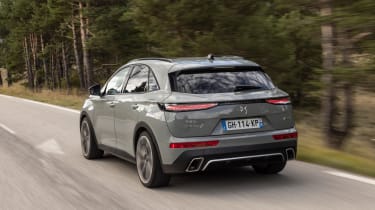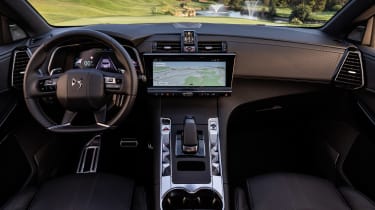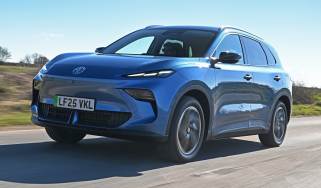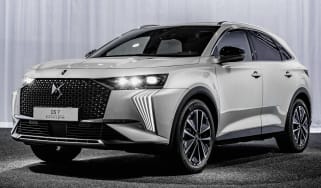DS 7 E-TENSE review
The plug-in hybrid DS 7 E-TENSE SUV offers up to 43 miles of electric range and plenty of luxurious touches, but it's quite expensive
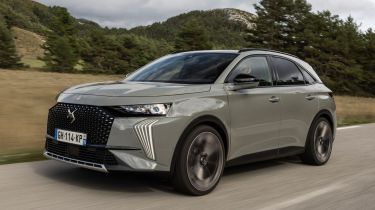
Pros
- Useful electric range
- Great technology
- Reasonably fast
Cons
- Very expensive
- Ride comfort is inconsistent
- Rivals have better infotainment
| Car type | Electric range | Fuel economy | CO2 emissions |
|---|---|---|---|
| Plug-in hybrid | 34-43 miles | 166-201mpg | 33-40g/km |
The DS 7 is the French brand’s largest SUV, and its answer to the upmarket German offerings like the Audi Q5, BMW X3 and Mercedes GLC. It focuses on being luxurious and comfortable, and like the DS 4 hatchback and DS 9 saloon it’s available as a plug-in hybrid, badged as the DS 7 E-TENSE.
The DS 7 line-up was given a facelift in summer 2022, receiving a larger grille and an eye-catching stack of LED daytime running lights that help distinguish the newer model. It also dropped the Crossback part of its name, so now you have DS Automobiles badging stretched across the tailgate, flanked by a slimmer set of LED tail-lights.
The DS 7 has been available with plug-in hybrid power for a while, but there are now three PHEV options to choose from. All use technology shared with the Peugeot 3008, Peugeot 508, Citroen C5 Aircross and Vauxhall Grandland X hybrids, with every plug-in hybrid DS 7 featuring a 1.6-litre turbocharged petrol engine.
The entry-level 222bhp hybrid, badged 225, has one electric motor and front-wheel drive. Meanwhile, the more powerful 4x4 300 and 4x4 360 versions, with 296 and 355bhp respectively, have a motor on each axle and four-wheel drive as their names suggest. These four-wheel drive versions are quick off the line, with 0-62mph times of under six seconds.
As is the case with the rest of the DS 7 line-up, the E-TENSE falls short in some areas. It’s not meant to be a sporty vehicle, so its lack of sharpness in corners and on fast B-roads isn’t really a surprise. More of a letdown is the ride quality, which uses intelligent adaptive dampers that prepare for bumps and potholes in advance by using cameras to scan the road ahead.
With the exception of during motorway driving, the system never quite delivers the comfort promised by DS, proving too wallowy in Comfort mode or too fidgety in Sport mode.
DS has given the top-of-the-range 4x4 360 a thoroughly different suspension setup, though – one that doesn’t focus too much on comfort – and it’s a happy middle ground, successfully transforming the DS 7’s driving experience. So it’s a shame that DS hasn’t done the same for the rest of the range, especially given that the brand expects only one in 10 buyers to choose the performance-focused range-topper.
The eight-speed automatic gearbox is another frustration: it’s slow to change down, relying on the electric motors to make up for its sluggishness with the instant acceleration they provide.
With enough charge in the battery, the DS 7's four-wheel-drive mode allows it to drive off-road in silence, save for the occasional input from the engine when extra torque is required. The on-road tyres limit the amount of traction (this is no Range Rover, after all), but the ability to tackle tougher terrain is a boost nonetheless.
In truth, the DS 7 E-TENSE is at its happiest in all-electric, zero-emissions mode, when it offers a smooth, refined drive: it’ll even do speeds of up to 83mph without assistance from the engine. All three plug-in DS 7 models have a 14.4 kWh battery (up from 13.2kWh in the pre-facelift model) for a range of up to 43 miles in mixed driving conditions.
Hybrid mode also has its benefits, with the system working out the most efficient mix of the available electric and petrol power. Officially the SUV returns 166-201mpg, although achieving this figure in the real world relies on you keeping the battery topped up. CO2 emissions of 33-40g/km put the E-TENSE in some of the lowest Benefit-in-Kind company-car tax categories.
If we had to choose, the entry-level 225 would our pick of the range as the addition of four-wheel drive and some extra power in the 4x4 300 also adds around £5,000 to the DS 7 E-TENSE’s price tag. Meanwhile, the 4x4 360 is a very niche proposition and comes in at over £62,000 - more than a fully electric BMW iX3. But whether you should choose it over its slicker, better-executed German rivals, which are available for the same or similar money, is another matter entirely. For a more detailed look at the DS 7 E-TENSE, read on for the rest of our in-depth review…
